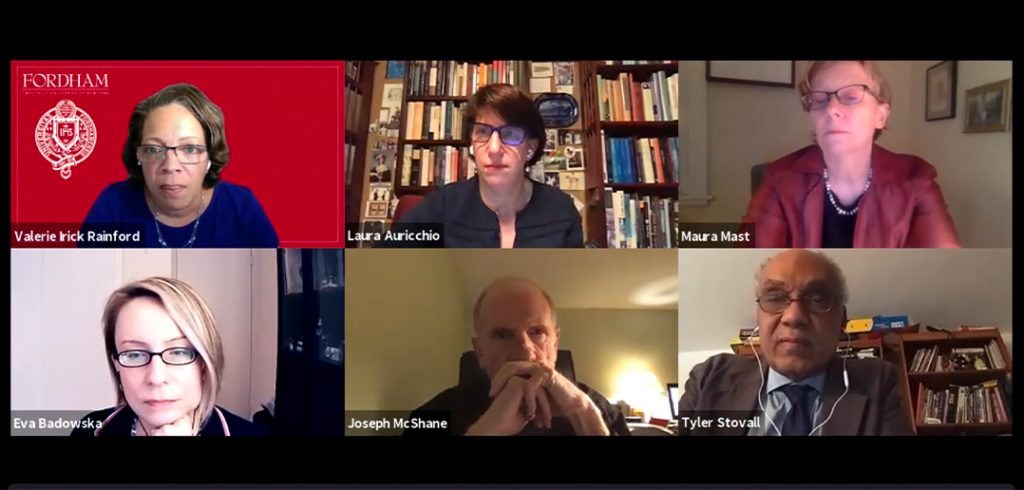“All of us thought we knew this issue, that we understood how to address it. But it has become clear that we have much to learn as citizens, as a University, and as a society. … The work of eradicating racism must become part of the very fabric of the University itself.”
With these words, Joseph M. McShane, S.J., president of Fordham, introduced an online discussion with Fordham’s deans of the arts of sciences on Tuesday evening, Oct. 13. The event, titled “Eradicating Racism in Arts and Sciences at Fordham University,” was moderated by Valerie Rainford, FCRH ’86, a member of the University’s Board of Trustees and the founder and CEO of Elloree Talent Strategies.
“The purpose of today’s session is to open a dialogue with the Fordham community,” said Rainford, a former managing director and head of Advancing Black Leaders strategy at JPMorgan Chase. A Fordham graduate, she began working with the deans this past summer to address issues of racism and inequity, and she is spearheading anti-racism trainings within the University as part of Fordham’s action plan for addressing racism. “We see this as a series of conversations, and today is just the start.”
Eva Badowska, Ph.D., dean of the faculty of arts and sciences and associate vice president for arts and sciences, said the four deans’ efforts unite undergraduate and graduate programs at the University. “We as a leadership team in arts and sciences have committed ourselves to the work of anti-racism,” she said.
During the event, the deans addressed several questions that had been submitted in advance, including one from someone who asked why such a discussion was necessary at Fordham.
Laura Auricchio, Ph.D., dean of Fordham College at Lincoln Center, responded by noting that this past spring, after the May 25 killing of George Floyd galvanized nationwide protests against racial injustice, Fordham “started hearing an outpouring of testimonials” from students and alumni of color who described their experiences of discrimination on campus. She cited two Instagram accounts, in particular: Black at Fordham and Let’s Talk About It Fordham.
“Hundreds of stories were told on these Instagram accounts, and my fellow deans and I read every single one of them,” Auricchio said. “These social media posts were a wake-up call. They prompted us to start having conversations that we might never have had before … with an ear to learning where there might be opportunity for change.”
Tyler Stovall, Ph.D., became dean of the Graduate School of Arts and Sciences in July, and said that anti-racism work “was part of my introduction to Fordham University.”
“I was literally hired the same week that George Floyd was murdered,” Stovall said. “For me, being an African American dean at Fordham has called up both opportunities and responsibilities. It has meant that I have to think about what other members of the African American community are experiencing and the ways in which my position can be an asset to that community and, through that community, an asset to Fordham as a whole.”
Maura Mast, Ph.D., dean of Fordham College at Rose Hill, noted that Stovall, in the deans’ first training session together, had challenged his colleagues: “He said, ‘Why now? Why are you committed to this now? And how do I know that you’re going to carry through that commitment?’”
“It was an opportunity to be humble,” Mast said.
She told the audience that she and her fellow deans have heard from Fordham’s students that they want Fordham to commit to combating anti-Blackness and racism at the University. To that end, deans and faculty have engaged in brainstorming sessions and role-playing activities “to discern, perceive, and disrupt racism,” she said, using a phrase that Badowska coined to describe the deans’ approach to the problem.
“We’re reckoning with ourselves, with our history of being indoctrinated with racism,” Mast said. “We need to educate ourselves so we can educate others.”
As part of that reckoning, the four deans and their staffs have undertaken a joint self-education, working with two consultants, Kathy Obear, Ed.D., and Michelle Loyd-Paige, Ph.D. The deans noted that Rainford has been instrumental in pushing them to engage in this process in a way that will benefit the Fordham arts and sciences community as a whole.
Several people in the audience wanted to know how anti-racism would be reflected in the University’s curriculum, and Badowska described some of those efforts.
“There is an initiative to really review and explore the existing core curriculum,” she said, noting that while that process will take some time, departments are already exploring pilot-level curriculum initiatives with the assistance of Rafael Zapata, Fordham’s chief diversity officer, special assistant to the president for diversity, and associate vice president for academic affairs. And since faculty are central to any curricular initiatives, she also described broad efforts to recruit and retain diverse faculty, stating that of 26 arts and sciences faculty members hired this year, 46% reported their race as non-white.
The deans, in recent communications to arts and sciences faculty, also highlighted initiatives like the formation of the Deans’ Anti-Racism Advisory Committee, and efforts to develop and implement anti-racism trainings for faculty and first-year students.
Throughout the conversation, the panelists made clear that while work has already started to bring anti-racism to the forefront of Fordham’s arts and sciences education, there is much more to be done, and that these must be ongoing conversations with and among all members of the Fordham community, including alumni.
“We are learning now from one another in ways that are very important, and sometimes very hard, very uncomfortable,” Father McShane said at the close of the discussion. “But they are necessary for us. This endeavor is mission-central, mission-critical, mission-essential.”

